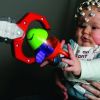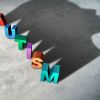-
 +8 +3
+8 +3How incy-wincy spider could show if your child is autistic
Autism can be spotted in babies as young as four months old simply by monitoring their response to games such as peek-a-boo or incy-wincy spider, a new study suggests.
-
 +13 +2
+13 +2Success of blood test for autism affirmed
One year after researchers published their work on a physiological test for autism, a follow-up study confirms its exceptional success in assessing whether a child is on the autism spectrum. A physiological test that supports a clinician’s diagnostic process has the potential to lower the age at which children are diagnosed, leading to earlier treatment. Results of the study, which uses an algorithm to predict if a child has autism spectrum disorder (ASD) based on metabolites in a blood sample, published online today, appear in the June edition of Bioengineering & Translational Medicine.
-
 +12 +4
+12 +4The right mix of gut microbes relieves autism symptoms in the long run
Giving children with autism a healthier mix of gut bacteria as a way to improve behavioral symptoms continued to work even two years after treatment ended. The finding may solidify the connection between tummy troubles and autism, and provide more evidence that the gut microbiome — the collection of bacteria and other microbes that live in the intestines — can influence behavior.
-
 +7 +1
+7 +1How Google Glass can teach autistic children to read emotions
Children with autism have difficulty reading social cues and discerning other people’s emotions. Studies have shown that using Google Glass improves their ability to read facial expressions, making it an ideal tool in places such as China that have few therapists available.
-
 +13 +3
+13 +3Personalized “deep learning” equips robots for autism therapy
Machine learning network offers personalized estimates of children’s behavior.
-
 +23 +3
+23 +3Success of blood test for autism affirmed
One year after researchers published their work on a physiological test for autism, a follow-up study confirms its exceptional success in assessing whether a child is on the autism spectrum. A physiological test that supports a clinician’s diagnostic process has the potential to lower the age at which children are diagnosed, leading to earlier treatment. Results of the study, which uses an algorithm to predict if a child has autism spectrum disorder (ASD) based on metabolites in a blood sample, published online today, appear in the June edition of Bioengineering & Translational Medicine.
-
 +14 +2
+14 +2Mobile App for Autism Screening Yields Useful Data
A Duke study of an iPhone app to screen young children for signs of autism has found that the app is easy to use, welcomed by caregivers and good at producing reliable scientific data. The study, described June 1 in an open access journal npj Digital Medicine, points the way to broader, easier access to screening for autism and other neurodevelopmental disorders. The app first administers caregiver consent forms and survey questions and then uses the phone’s ‘selfie’ camera...
-
 +21 +1
+21 +1The truth about Hans Asperger’s Nazi collusion
Simon Baron-Cohen absorbs the grave revelations in a study on a paediatrician enmeshed in autism’s history.
-
 +18 +3
+18 +3Is it Time to Give Up on a Single Diagnostic Label for Autism?
That was the ruling by the editors of the authoritative Diagnostic and Statistical Manual in 2013, but it remains controversial
-
 +10 +2
+10 +21 in 59 children has autism, CDC says
One in 59 US children has autism, according to a new report from the US Centers for Disease Control and Prevention. The new estimate is a prevalence rate of 1.7%, up from one in every 68 children (1.5%) in the 2016 report, which was based on data from 2012. The new figure was derived from 2014 estimates for 8-year-olds diagnosed with an autism spectrum disorder in 11 communities across the nation.
-
 +14 +2
+14 +2The CDC Says Autism Rates Are Rising in U.S. Children. No, It's Not Because of Vaccines.
A new CDC autism report finds that rates of autism are rising among U.S. children. Given the fraught history of the (consistently debunked) allegations that vaccines are tied to autism spectrum disorders, there may be an impulse in certain corners to bring up vaccinations as a potential root for this rise in diagnoses. The scientific consensus still resoundingly rejects that argument.
-
 +11 +1
+11 +1Dogs cannot get ‘autism’, British Veterinary Association warns after ‘anti-vaxx’ movement spread to pets
Dogs cannot get ‘autism’, the British Veterinary Association has warned, after the ‘anti-vaccine’ movement spread to pets. 'Anti-vaxxers' believe that immunisations have harmful side effects and may be the cause of autism in children - beliefs widely debunked by the medical community. This theory is increasingly being applied to pets, particularly in the US, and there are fears it is spreading to the UK and could cause already low vaccination rates to fall.
-
 +33 +2
+33 +2Dogs cannot get ‘autism’, British Veterinary Association warns after ‘anti-vaxx’ movement spread to pets
Dogs cannot get ‘autism’, the British Veterinary Association has warned, after the ‘anti-vaccine’ movement spread to pets.
-
 +4 +1
+4 +1When the Way You Love Things Is “Too Much”; or: Why I Went to Portmeirion
The author on her love for ‘The Prisoner,’ her pilgrimage to the town where it was filmed, and the pressure she felt as an autistic person to downplay the intensity of her interests. By Sarah Kurchak.
-
Current Event+20 +5
Missing boy with autism presumed dead; father arrested for killing him: Authorities
Tennessee authorities have arrested a father for allegedly killing his 5-year-old son, who had autism and was non-verbal. The boy was reported missing earlier this week.
-
 +25 +4
+25 +4Autism’s social deficits are reversed by an anti-cancer drug
Of all the challenges that come with a diagnosis of autism spectrum disorder (ASD), the social difficulties are among the most devastating. Currently, there is no treatment for this primary symptom of ASD. New research at the University at Buffalo reveals the first evidence that it may be possible to use a single compound to alleviate the behavioral symptoms by targeting sets of genes involved in the disease.
-
 +14 +4
+14 +4'France is 50 years behind': the 'state scandal' of French autism treatment
Like thousands of French children whose parents believe they have autism, Rachel’s six-year-old son had been placed by the state in a psychiatric hospital day unit. The team there, of the school of post-Freudian psychoanalysis, did not give a clear-cut diagnosis.
-
 +14 +2
+14 +2The Prevalence of Autism in the U.S. Appears Steady
New data suggest the rate hovers between two and three percent
-
 +21 +5
+21 +5Autism therapy: Social behavior restored via brain stimulation
Scientists are examining the feasibility of treating autistic children with neuromodulation after a new study showed social impairments can be corrected by brain stimulation. The research from the O’Donnell Brain Institute provides the first evidence that a specific part of the cerebellum, a region near the brain stem that has long been thought to only have roles in coordinating movement, is critical for autistic behaviors.
-
 +22 +4
+22 +4Social phobia linked to autism and schizophrenia
New Swinburne research shows that people who find social situations difficult tend to have similar brain responses to those with schizophrenia or autism. The research, published in Psychiatry Research: Neuroimaging, found the areas of the brain that show increased response when exposed to unexpected speech sounds or ‘phonemes’ are associated with the processing of social information and linked with spectrum conditions such as autism or schizophrenia.
Submit a link
Start a discussion




















